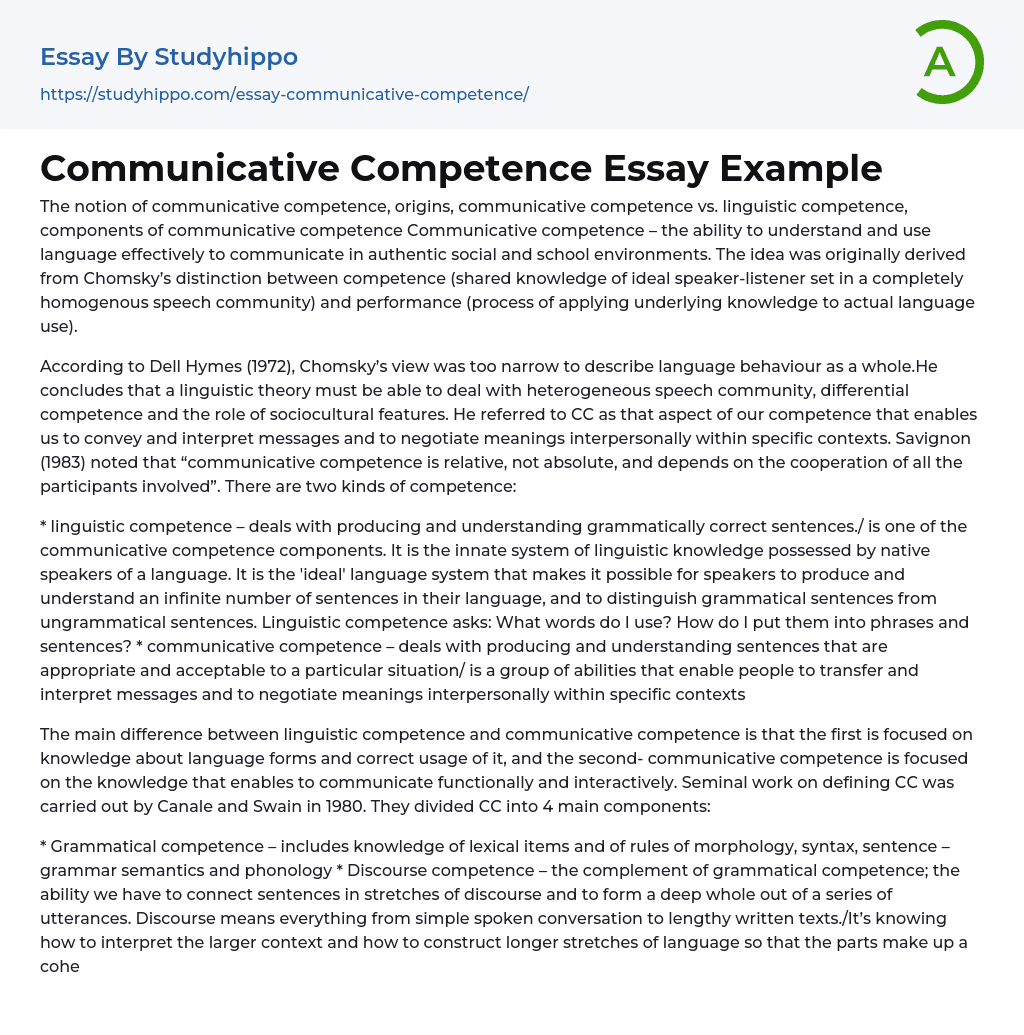The notion of communicative competence, origins, communicative competence vs. linguistic competence, components of communicative competence Communicative competence – the ability to understand and use language effectively to communicate in authentic social and school environments. The idea was originally derived from Chomsky’s distinction between competence (shared knowledge of ideal speaker-listener set in a completely homogenous speech community) and performance (process of applying underlying knowledge to actual language use).
According to Dell Hymes (1972), Chomsky’s view was too narrow to describe language behaviour as a whole.He concludes that a linguistic theory must be able to deal with heterogeneous speech community, differential competence and the role of sociocultural features. He referred to CC as that aspect of our competence that enables us to convey and interpret messages and to negotiate meanings interperson
...ally within specific contexts. Savignon (1983) noted that “communicative competence is relative, not absolute, and depends on the cooperation of all the participants involved”. There are two kinds of competence:
* linguistic competence – deals with producing and understanding grammatically correct sentences./ is one of the communicative competence components. It is the innate system of linguistic knowledge possessed by native speakers of a language. It is the 'ideal' language system that makes it possible for speakers to produce and understand an infinite number of sentences in their language, and to distinguish grammatical sentences from ungrammatical sentences. Linguistic competence asks: What words do I use? How do I put them into phrases and sentences? * communicative competence – deals with producing and understanding sentences that are appropriate and acceptable to a particular situation/ is a group of abilities that enable people to transfer and
interpret messages and to negotiate meanings interpersonally within specific contexts
The main difference between linguistic competence and communicative competence is that the first is focused on knowledge about language forms and correct usage of it, and the second- communicative competence is focused on the knowledge that enables to communicate functionally and interactively. Seminal work on defining CC was carried out by Canale and Swain in 1980. They divided CC into 4 main components:
* Grammatical competence – includes knowledge of lexical items and of rules of morphology, syntax, sentence – grammar semantics and phonology * Discourse competence – the complement of grammatical competence; the ability we have to connect sentences in stretches of discourse and to form a deep whole out of a series of utterances. Discourse means everything from simple spoken conversation to lengthy written texts./It’s knowing how to interpret the larger context and how to construct longer stretches of language so that the parts make up a coherent whole.
* Sociolinguistic competence – the knowledge of the sociocultural rules of language and discourse. They believe that the knowledge of these rules will be crucial in interpreting utterances for social meaning./It’s knowing how to use and respond language appropriately given the setting, the topic, and the relationships among the people communicating. * Strategic competence – it is made up of verbal and non verbal communication. The competence underlying our ability to make repairs, to cope with imperfect knowledge and to sustain communication through paraphrase, repetition, hesitation, avoidance etc. It is knowing how to recognize and repair communication breakdowns, how to work around gaps in one’s knowledge of the language, and how
to learn more about the language and in the context.
Communicative competence components: 1. Linguistic competences: * Lexical competence- knowledge of, ability to use the vocabulary of a language, consists of lexical elements and grammatical elements; * Grammatical competence- may be defined as the knowledge of, and ability to use the grammatical resources of a language; * Semantic competence- deals with the learner’s awareness and control of the organization of meaning * Phonological competence
- Greeting essays
- Orality essays
- Intercultural Communication essays
- Interpersonal Communication essays
- Cross-Cultural Communication essays
- Nonverbal Communication essays
- Effective Communication essays
- Communication Skills essays
- Academia essays
- Higher Education essays
- Language Learning essays
- Studying Business essays
- Education System essays
- Study essays
- First Day of School essays
- Scholarship essays
- Pedagogy essays
- Curriculum essays
- Coursework essays
- Studying Abroad essays
- Philosophy of Education essays
- Purpose of Education essays
- Brainstorming essays
- Educational Goals essays
- Importance Of College Education essays
- Brown V Board of Education essays
- The Importance Of Higher Education essays
- Online Education Vs Traditional Education essays
- Academic And Career Goals essays
- Academic Integrity essays
- Brown Vs Board Of Education essays
- Distance learning essays
- Technology in Education essays
- Vocabulary essays
- Writing Experience essays
- Importance of Education essays
- Early Childhood Education essays
- Academic Degree essays
- Academic Dishonesty essays
- School Uniform essays
- Academic writing essays
- Cheating essays
- Bachelor's Degree essays
- MBA essays
- College Life essays
- Grade essays
- Diploma essays
- Phonology essays
- Sentence essays
- Filipino Language essays




